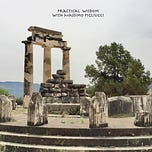“I put my questions to Lysis: ‘I suppose, Lysis, your father and mother love you very much?’
‘Of course,’ he replied.
‘Then they’d want you to be as happy as possible?’
‘Naturally.’
‘Do you think that a man is happy when he’s a slave and allowed to do nothing he desires?’
‘Heavens, no, I don’t,’ he said.
‘Then if your father and mother love you and desire your happiness, it’s absolutely clear that they must do their best to make you happy.’
‘Of course,’ he said.
‘So they let you do what you want and don’t scold you at all or stop you doing what you desire?’
‘Heavens, no, Socrates, there are lots and lots of things they stop me doing.’
…
‘So your father deliberately sets lots and lots of bosses and masters over you. But when you go home to your mother, she lets you do what you want with her wool or her loom when she’s weaving, so that she can see you perfectly content.’
Lysis laughed and said, ‘Heavens, Socrates, not only does she stop me, but I’d actually be beaten if I touched any of that.’
…
‘Well then, what have you done to make them behave so oddly and stop you being happy and doing what you want, and bring you up by keeping you all day long in a state of constant subjection to someone else and in short doing virtually nothing you desire.’
…
‘It’s because I’m not yet of age, Socrates,’ he said.
‘I’m not sure it’s that that stops you, Lysis, since both your father, Democrates, and your mother trust you to some extent, I imagine, without waiting until you’re of age. For example, when they want things read to them or written for them, I imagine they give that job to you before anyone else in the house. Don’t they?’
‘Of course,’ he replied.
…
‘So, Lysis, what on earth can be the reason for their not stopping you in those cases, whereas they do stop you in the ones we were speaking of just now?’
‘I suppose it’s because I know about those things but not the others,’ he replied.
‘Well,’ I said. ‘Excellent! So your father is not waiting for you to come of age to trust everything to you, but on the day he considers that you know better than himself, he’ll trust both himself and his property to you.’
‘I expect so,’ he said.”
(Lysis, 207d-209d)













Share this post